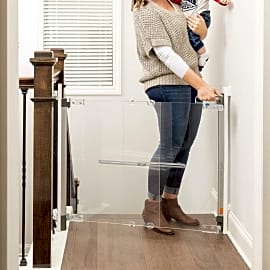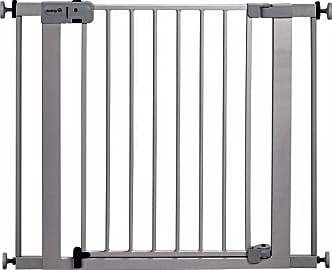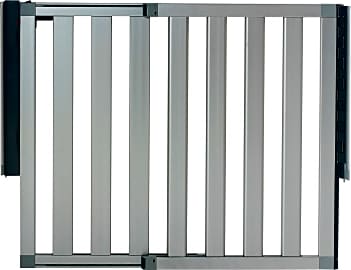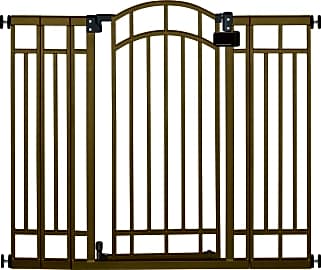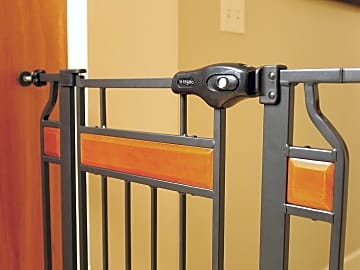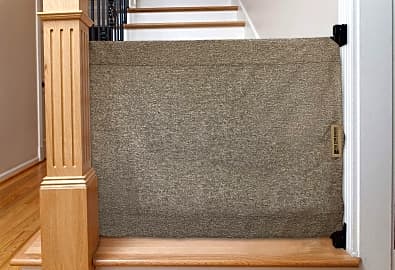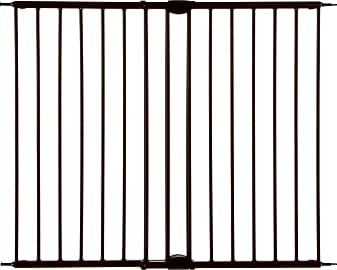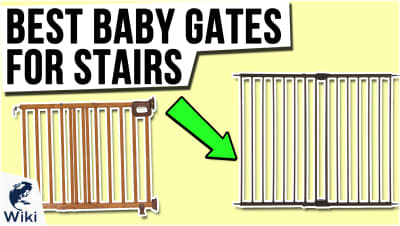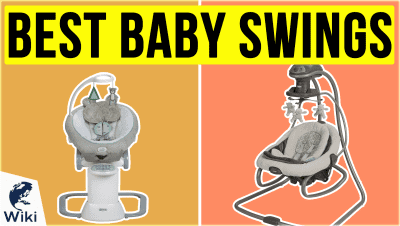The 10 Best Baby Gates

This wiki has been updated 39 times since it was first published in May of 2015. Crawling babies and toddlers have an endless curiosity of the world without any sense of self-preservation. Protect your precious rug rats from falling down stairs or getting into dangerous areas with one of these baby gates. Our selection includes basic models for securing standard-width staircases and doorways, plus units that can block off irregular spaces or even whole rooms. When users buy our independently chosen editorial selections, we may earn commissions to help fund the Wiki.
Editor's Notes
May 05, 2020:
The two basic sort of baby gates on the market are either pressure mounted and wall mounted. While the safer gate would be the one that can't be removed from the walls, remember that any child young enough to need to be corralled with a gate should also be supervised anyway. And there are times when a pressure-mounted gate is preferable, like if you need one that can be moved from room to room, you're visiting grandma's house, or your lease prevents you from making holes in the wall. Just be sure to never use a pressure-mounted gate to block a stairway or any other elevated opening.
To get the best of both worlds we included the Dreambaby Chelsea and the Summer Infant Multi-Use, both of which can be used pressured mounted, or permanently attached to one opening, even stairways, when mounted into the wall. The Dreambaby Chelsea can also accommodate added extensions to cover a wider than normal opening up to 198 inches.
For this update we added the Cardinal Gates Stairway Special to the top spot because of its extra attention to stairway safety. The locking mechanism is secure but easy for adults to use, plus it's made of metal, to last through multiple children. The Cardinal also has the added unusual feature that it can be mounted up to a 30 degree angle which may be important for a curving landing, or if the wall stud is not exactly where you want it to be.
Do I Really Need A Baby Gate?
Of course, toddlers always need to be supervised, but gates provide an open view for parents to keep tabs from a distance while children learn to entertain themselves.
For some parents, baby gates rank right up there with mini-vans as an uncool marker of parenthood to which they'll never succumb. New parents look at their immobile little cherubs and imagine they'll train their young charges to roam the house responsibly and never have to stoop to putting them behind bars, but eventually their little angels get on the move.
For many, it can be difficult to imagine just how much trouble a toddler can get into in less than 30 seconds until they've experienced it first hand. Before they know it, most young parents will be asking one another not if they should buy a baby gate, but rather how many baby gates they should get. A baby gate should not be looked at as some kind of gloomy tool used to train children to take their place within the prison industrial complex, but rather as a ticket to small amounts of freedom for parent and child.
A well-child-proofed room with a sturdy baby gate can give parents a much needed break and instill in young toddlers a sense of independence that playing in a small playpen or with mommy and daddy always present cannot provide. Of course, toddlers always need to be supervised, but gates provide an open view for parents to keep tabs from a distance while children learn to entertain themselves.
Fortunately for parents, baby gates, much like modern mini-vans, have come a long way in style, function, and versatility.
The Evolution Of The Baby Gate
A lot has changed in the world of baby gates since I was a child and my younger siblings had a simple wooden gate that locked into place in a doorway. While the simplest gates still serve a purpose, changes in the American lifestyle have necessitated changes in how we keep our inquisitive toddlers safe. Parents continue to demand safety for their children, but not at the expense of their style or busy schedules.
The most popular models have convenient features like the ability to walk through the gate with an easy, one-handed locking system.
Over the past 40 years, the size of the average American home has increased by almost 1,000 square feet. With this massive increase has come larger room sizes (and a larger number of rooms) that necessitate baby gates have a flexibility to cover wide areas while still being easy to move from room to room. Many baby gates have a modular style to accommodate different wall configurations instead of the old-fashioned style that fits standard doorways, give or take a few inches.
Another dramatic shift in the American lifestyle, especially in that of the American family, is that the average age of new mothers continues to rise. Older parents are often more established and more demanding when it comes to the things they put in their homes. The choices of decorative gates made with more upscale materials, like steel or attractive hardwoods, has grown.
The functionality of baby gates also continues to evolve. The most popular models have convenient features like the ability to walk through the gate with an easy, one-handed locking system. Some even close behind you automatically or can be reconfigured into a playpen. These features often come at a higher cost, so if you need to install multiple gates around your home or you are just really tall and can step over the gates easily, a simple unit could still be your best bet.
Baby Gate Safety
As with most baby products, the good news is that safety measures are constantly evolving and improving; even with that in mind, it is of the utmost importance with baby gates that users read and follow all instructions with this particular piece of equipment.
The most important safety measure parents need to remember is to never use a pressure-mounted baby gate at the top of a staircase. Often this is the leading cause of gate-related injuries, especially in younger toddlers who will push on the gate without thinking of the consequences. Parents who need to gate off the top of a staircase must only use a wall-mounted model to prevent ambitious (and sometimes freakishly strong) little ones from pushing it over and toppling down the stairs, gate and all.
The second leading cause of gate injuries with small children is getting something pinched in the locking mechanisms of the walk-through style of gate. If parents aren't sure they can remember to close the gate completely after every time they pass through it, look for model featuring a magnetic closure that pulls the door shut and locks by itself.
While no one can ever (and probably shouldn't try to) prevent all childhood injuries, the right baby gate can keep children at the most vulnerable ages safe from serious injuries such as falls, and give everyone in the family a little space to breathe.




